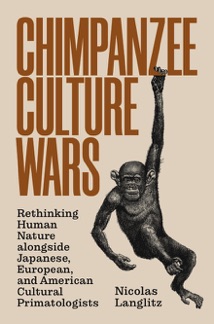
Nicolas Langlitz
I'm an anthropologist and historian of science who takes philosophical questions out of the armchair to the field. My fields are medicine, the life sciences, and the behavioral sciences where I look for interlocutors who share my curiosity about Homo sapiens as an animal that has changed beyond recognition and, for better and worse, shows no signs of settling down. At present, I’m especially interested in our predicament as a species of moralistic apes and in research approaches that cut across the disciplinary divide between social research, humanities scholarship, and the natural sciences.
It is in this borderland between very different knowledge cultures where I have been socialized. During my training as a physician at Freie Universität Berlin, I contributed to research in biological psychiatry, followed the local anti-psychiatric movement, and wrote the history of an obscure practice in French psychoanalysis (Die Zeit der Psychoanalyse: Lacan und das Problem der Sitzungsdauer, Suhrkamp, 2005). By the time, I graduated from medical school, I was sufficiently alienated from Lacanian analysts, anti-psychiatric activists, and biological psychiatrists alike to continue pursuing such endeavors from a scholarly distance. And so I became a historian and ethnographer.
From cultural anthropology and the history of science and medicine, I learned to attend to competing and changing conceptual schemes, knowledge practices, material cultures, and institutional organizations that inform diverse and often incongruent conceptions of who we are. I work from the assumption that the possibility of multiple perspectives on human life does not just reflect back on the people who study it but often tells us something important about human life itself. As my focus shifted from psychoanalytic to neuroscientific and evolutionary frameworks, my research followed the historical transition from understanding and acting upon the mind in psychological terms to the current predominance of biological approaches. As anthropologist of science, I have written two more books, Neuropsychedelia: The Revival of Hallucinogen Research since the Decade of the Brain (University of California Press, 2012) and Chimpanzee Culture Wars: Rethinking Human Nature alongside Japanese, European, and American Cultural Primatologists (Princeton University Press, 2020). Regionally, my inquiries trail the cosmopolitan geographies of the scientific fields I study and have taken me from Germany to Switzerland, the United States, Japan, Guinea, and Ivory Coast.
I also conduct participant observation of Homo academicus as Professor of Anthropology at the New School for Social Research in New York.
What’s new?
I've recently set up a Psychedelic Humanities Lab at The New School.
From 2023 to 2026, I am working with my co-PIs Dimitris Repantis (psychiatry), Sascha Fink (philosophy), Christoph Bublitz (law), and Torsten Voigt (sociology) on the project "PsychedELSI – Ethical, Legal, and Social Implications of the Psychedelic Renaissance," funded by the German Federal Ministry of Research and Education.
I am also working on the Taiwanese-German project "Psychedelic Transformations: A Taiwanese-German Comparison of Ethical and Sociocultural Aspects of New Therapies" (2024-2026).
Our Frontiers special issue on Psychedelic Humanities has been published as an e-book:
— Dyck, Erika, Tehseen Noorani, Nicolas Langlitz, Alex Dymock, Anne K. Schlag, and Oliver Davis, eds. Psychedelic Humanities. Lausanne: Frontiers Media SA, 2024.
Here are some articles and essays I have published in the past year:
— Nicolas Langlitz and Alex Gearin, "Psychedelic Therapy as Form of Life." Neuroethics 17:14 (2024), 1-19. [Full text]
— "The moral economy of diversity: How the epistemic value of diversity transforms late modern knowledge cultures" (with Clemente de Althaus).
— "The Making of a Mushroom People: Toward a Moral Anthropology of Psychedelics Beyond Hype and Anti-hype.”
— “What Good Are Psychedelic Humanities?”
My latest book Chimpanzee Culture Wars came out in 2020.
For further updates, follow me on Twitter @NicolasLanglitz.
